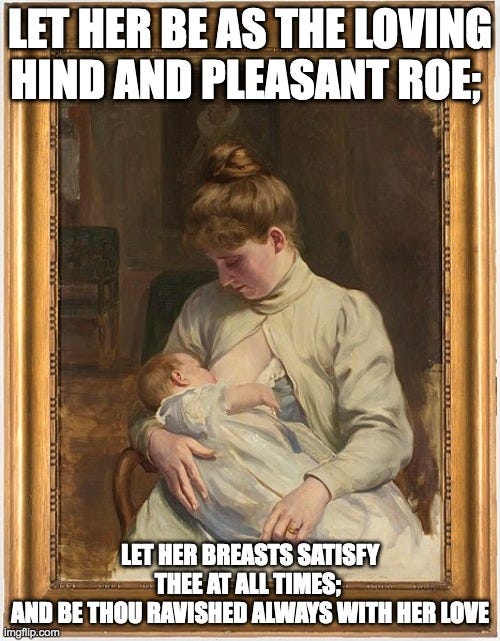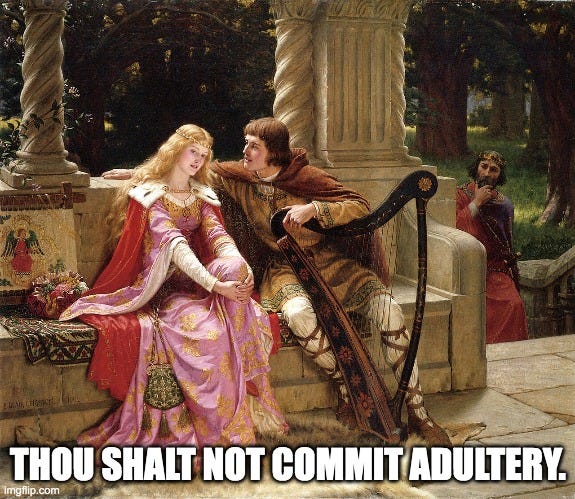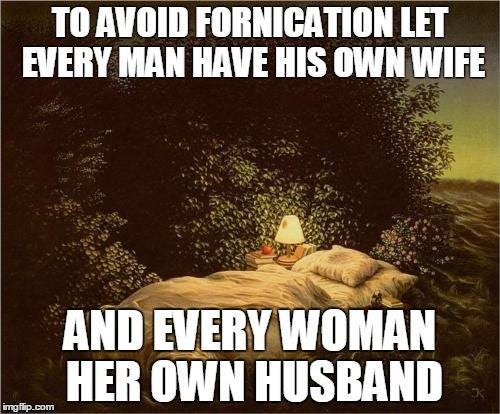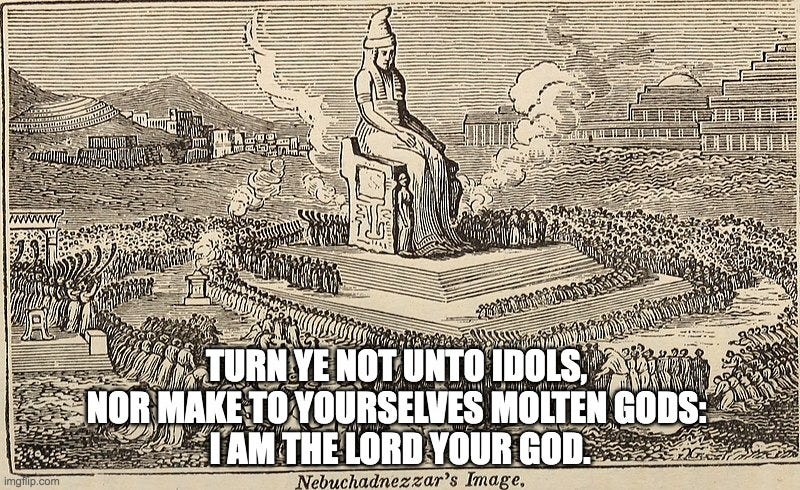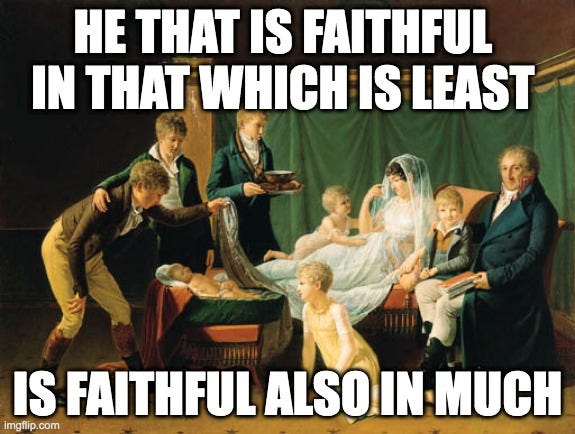So Ryan has responded in the comments and continues to be interested in the issue of covenant in marriage. He writes:
You stated in the comments section of the article responding to my previous query:
“As for covenants having at least two parties, both of whom agree to something, yes, that is normal but, as Webster pointed out, it is not universal. There must be two parties of some sort, but they don't both need to give, or even give the same.
My own opinion, not to go too far out on a limb, is that the covenant of marriage was established in Genesis 2, and the rest of us kind of join it as it comes our turn.”
*****
I *think* I can appreciate and possibly agree with your conclusion, but I think it needs more work to establish why it should be viewed in that way, and I’ll push on as a Berean (or devil’s advocate!) for clarity’ sake.
If marriage was established as a covenant in Genesis 2, and if it was established by God, not by Adam, why was it not made more explicit in covenantal language when the explanation is clearly being given that it is to be a “leave and cleave” one flesh relationship per Gen. 2:24? I find it unlikely that such a monumental deal would be left with ambiguity.
There are other statements in Scripture of how a thing ought to be - such as parents should teach their children diligently (Duet. 6:7) - and the mere statement or even a command of how a thing ought to be, does not seem to equate to a covenant. So, “therefore shall a man leave his father and mother and shall cleave to his wife” does not automatically qualify it as elevated to a covenantal relationship in my mind. It simply states what ought to be.
To this point, looking at the rest of the covenants enumerated in Scripture, they generally appear to be explicit covenants, not implicit, and they are expressly declared to be such. God does not keep his covenants a secret, from Noah, onward. Other covenants such as between Jacob and Laban, David and Jonathan, and between kings and their people are clearly stated as such. This makes an unspoken and undefined “marriage covenant” a glaring exception.
The marriage “covenant” is not explicitly stated in the vast majority of marriages in the Old Testament with the possible exception of the passages in Ezekiel and Malachi, neither of which are specific to named human individuals and both of those do not *require* the implication that all other marriages are explicitly covenants. The Ezekiel 16:8 passage certainly compares God’s relationship to Jerusalem to a marriage, but it is also clearly an analogy and descriptive and not necessarily prescriptive to the exact way that men and women should come together in every marriage. It does bend the picture towards a one-sided covenant, though and I *do* agree with your mention that the Noahic covenant appears to be essentially one-sided.
As another commenter mentioned, there is room for interpretation in the Malachi 2:14 passage that it is referencing marriages appropriate to the Mosaic covenant vs specific marriage covenants, but presuming otherwise, the implication is still that a covenant was made, that was not being honored,
Here are some more questions to help define things further:
Implications:
1. If marriage was NOT found to always be a covenant, how does this affect our view of marriage?
2. Can law, obligation, required obedience, as in a marriage, exist without a formal covenant?
3. Is marriage somehow less important if it is of a non-covenantal nature?
4. Is the marriage covenant generally one-sided, and implicit?
5. Is it “not a marriage” if the man does not understand it as covenant but is faithful to his wife regardless?
6. Can a covenant exist where no declaration of such has been made?
Specific cases:
1. If marriage is always a covenant, how do we view scenarios like Jacob and Leah? In that case, it would seem that none if the conditions of the Websters dictionary definition of covenant is necessarily met. Is a covenant possibly required by an sexual act even where intent was not present?
2. Is marriage in general a de facto covenant even where no personally directed intent existed?
3. Since a covenant or treaty between Jacob and Laban is mentioned in Genesis 31, why is no covenant discussed regarding Jacob's marriages to his two daughters?
4. In the cases of Dueteronomy 21:11-14 is marriage a one-way covenant?
5. In the case of the Benjamites in Judges 21, are such marriages also one-way covenants?
Blood and covenants.
Hebrews 9 is pretty clear that the shedding of blood - by death - is a condition of a covenant. While there are a few passages that do not directly mention the shedding of blood for a man’s covenant - say, the covenant between David and Jonathan - it does appear that it was understood by the Hebrew people that it was a required component, and it seems that it’s practice continued even into the time of the prophets - see Jer. 34:18-19.
You mention the blood in relation to the consummation of marriage to a virgin, but I am skeptical that this in ANY way qualifies. Also, say in the case of a second marriage, such as of the widow in 1 Cor. 7:39, (which is an interesting verse) there might not be any blood... also, it says she is bound by the law, vs by covenant.
I suppose that you could argue that the Noahic covenant’s shedding of blood was asacrifice
In contrast, Jesus, who clearly made a covenant with the church, shed His blood for His bride. In this covenant the bride’s blood is not what is shed in the marriage picture of Christ and the church.
In summary, I am not at all opposed to a Christian marriage including a man’s covenant as a picture of Christ and the church, but I’m not convinced that *all* marriages are, or of necessity must be covenantal. I do believe that all marriages must meet God's definition, and all marriages fall under the jurisdiction of Biblical obligation(s) with regards to marriage.
Ryan
There are times when we can get so caught up in a word that we can ignore the reality that the word represents. I just got done a long text thread where we ended up arguing about whether passing on their cultural values was part of the ‘definition’ of an empire. In my reply I sort of hinted that the ‘definition’ wasn’t as important as the reality.
So here, with Ryan’s question, which is getting very deeply into the weeds as to what a ‘covenant’ is. Which is all fun and interesting as long as we don’t forget what a covenant is. Or, in other words, what are the fruits of the definition you are using, and what is the fruit of the thing you are defining? Or, is the concept of ‘covenant’ one of Plato’s ideas, or God using it to communicate something to us?
When we look at the way God deals with marriage (and, I would argue, man deals with marriage, but that should be another post,), including where He calls it a ‘covenant’ and where He doesn’t explicitly do so, are there attributes to what He is saying that, regardless of what word that we use, we need to understand in order to regulate our own behaviour?
History
Let us see the proof and aggravations of the charge. [1.] It is sufficiently proved by the testimony of God himself: “The Lord has been witness between thee and the wife of thy youth (Mal 2:14), has been witness to the marriage-covenant between thee and her, for to him you appealed concerning your sincerity in it and fidelity to it; he has been a witness to all the violations of it, and all thy treacherous dealings in contempt of it, and is ready to judge between thee and her.” Note, This should engage us to be faithful both to God and to all with whom we have to do, that God himself is a witness both to all our covenants and to all our covenant-breaches; and he is a witness against whom there lies no exception.
Matthew Henry
Before I get more into the depths of this answer, I should mention that the idea that marriage is a covenant falls squarely in the realm of Christian orthodoxy. All of the orthodox reformed commentators stated it was such.
There have been few subjects that Godly writers have written on more often, or Godly preachers have preached on more often, than marriage. Marriage and the resulting family. The history of the church, with some excursions into gnostic heresy, has been one of promoting and protecting marriage and the family.
Treachery
Yet ye say, Wherefore? Because the LORD hath been witness between thee and the wife of thy youth, against whom thou hast dealt treacherously: yet is she thy companion, and the wife of thy covenant.
And did not he make one? Yet had he the residue of the spirit. And wherefore one? That he might seek a godly seed. Therefore take heed to your spirit, and let none deal treacherously against the wife of his youth.
For the LORD, the God of Israel, saith that he hateth putting away: for one covereth violence with his garment, saith the LORD of hosts: therefore take heed to your spirit, that ye deal not treacherously.
Mal 2:14-16
If we take a step back from this passage and ask what God is telling us here, I think we would do well to look at the word ’treacherously’.
TREACHEROUSLY, adverb trech'erously. By violating allegiance or faith pledged; by betraying a trust; faithlessly; perfidiously; as, to surrender a fort to an enemy treacherously; to disclose a secret treacherously
You treacherously practic'd to undo me.
The key words here might be ‘allegiance’, ’trust’, ‘faith pledged’
TREACHERY, noun trech'ery. Violation of allegiance or of faith and confidence. The man who betrays his country in any manner, violates his allegiance, and is guilty of treachery This is treason. The man who violates his faith pledged to his friend, or betrays a trust in which a promise of fidelity is implied, is guilty of treachery The disclosure of a secret committed to one in confidence, is treachery This is perfidy.
So when we examine the nature of marriage, we need to examine it in the light of the noun ‘treachery’. The bond of marriage is so significant that God uses the word ‘treachery’ to define its breach.
I Cor 7
Defraud ye not one the other, except it be with consent for a time, that ye may give yourselves to fasting and prayer; and come together again, that Satan tempt you not for your incontinency.
Defraud ye not one the other,.... By withholding due benevolence, denying the use of the marriage bed, refusing to pay the conjugal debt, and which is called a "diminishing of her marriage duty", Exo 21:10 where the Septuagint use the same word "defraud", as the apostle does here; it is what both have a right to, and therefore, if either party is denied, it is a piece of injustice, it is properly a defrauding; though with proper conditions, such as follow, it may be lawful for married persons to lie apart, and abstain from the use of the bed, but then it should never be done,
John Gill
DEFRAUD, verb transitive [Latin To cheat.]
1. To deprive of right, either by obtaining something by deception or artifice, or by taking something wrongfully without the knowledge or consent of the owner; to cheat; to cozen; followed by of before the thing taken; as, to defraud; a man of his right.
We have corrupted no man, we have defrauded no man. 2 Corinthians 7:2.
The agent who embezzles public property, defrauds the state.
The man who by deception obtains a price for a commodity above its value, defrauds the purchaser.
2. To withhold wrongfully from another what is due to him. defraud not the hireling of his wages.
3. To prevent one wrongfully from obtaining what he may justly claim.
A man of fortune who permits his son to consume the season of education in hunting, shooting, or in frequenting horse-races, assemblies, etc., defrauds the community of a benefactor, and bequeaths them a nuissance.
4. To defeat or frustrate wrongfully.
By the duties deserted-by the claims defrauded.
And God uses the word ‘defraud’ to describe a violation of the act of marriage. In marriage, each spouse has sexual access to the other, and a failure to give that access is called ‘defrauding’.
Adultery
Thou shalt not commit adultery.
Exo 20:14
whoremongers and adulterers God will judge; the former of these may be rendered "fornicators", as it is by the Vulgate Latin version: fornication is a sin committed by single persons, unmarried ones; and though it was reckoned among the Gentiles a thing indifferent, yet is contrary to the law of God, and is a work of the flesh, and makes unfit for the kingdom of God, and brings down the judgments of God both here and hereafter. And this is in opposition to marriage, which is appointed to prevent it. The sin "adulterers" are guilty of, is a sin committed by persons, who are either one or both in a married state, and so is directly a pollution of the marriage bed: this was punishable with death by the law of God, and light of nature; and though men may make light of it, God will judge and punish such as commit it, both in this life, with diseases, poverty, and disgrace, and in the world to come, at the great day of account; for however secretly it may be committed, God, who is omniscient, sees it, and will bring it into judgment; nor shall any be able to escape the righteous judgment of God, for he is omnipotent, as well as omniscient. The Jews say,
"whoever lies with another man's wife, shall not escape דינה, "the judgment", or damnation of hell (t)''
(t) T. Bab. Sota. fol. 4. 2.
John Gill
H5003 (Strong)
נָאַף
nâ'aph
naw-af'
A primitive root; to commit adultery; figuratively to apostatize: - adulterer (-ess), commit (-ing) adultery, woman that breaketh wedlock.
Total KJV occurrences: 31
ADUL'TERY, noun [Latin adulterium. See Adulterate.]
1. Violation of the marriage bed; a crime, or a civil injury, which introduces, or may introduce, into a family, a spurious offspring.
By the laws of Connecticut, the sexual intercourse of any man, with a married woman, is the crime of adultery in both:such intercourse of a married man, with an unmarried woman, is fornication in both, and adultery of the man, within the meaning of the law respecting divorce; but not a felonious adultery in either, or the crime of adultery at common law, or by statute. This latter offense is, in England, proceeded with only in the ecclesiastical courts.
In common usage, adultery means the unfaithfulness of any married person to the marriage bed. In England, Parliament grant absolute divorces for infidelity to the marriage bed in either party; and the spiritual courts divorce a mensa et thoro.
2. In a scriptural sense, all manner of lewdness or unchastity, as in the seventh commandment.
3. In scripture, idolatry, or apostasy from the true God. Jeremiah 3:8.
4. In old laws, the fine and penalty imposed for the offense of adultery
5. In ecclesiastical affairs, the intrusion of a person into a bishopric, during the life of the bishop.
6. Among ancient naturalists, the grafting of trees was called adultery being considered as an unnatural union.
There are several very important things to remember when we approach the subject of adultery. First of all, that it is never defined. When God says ‘thou shalt not commit adultery’, we don’t read that the Israelites immediately broke into a discussion about which of their wives were the kind of wives, under the kind of contract, that would qualify for this injunction. Jew or Gentile, the Scriptures are clear, thou shalt not commit adultery.
Death
And the man that committeth adultery with another man's wife, even he that committeth adultery with his neighbour's wife,
the adulterer and the adulteress shall surely be put to death.
I. Lying with another man's wife was made a capital crime. The adulterer and the adulteress that had joined in the sin must fall alike under the sentence: they shall both be put to death, Lev 20:10. Long before this, even in Job's time, this was reputed a heinous crime and an iniquity to be punished by the judges, Job 31:11. It is a presumptuous contempt of an ordinance of God, and a violation of his covenant, Pro 2:17. It is an irreparable wrong to the injured husband, and debauches the mind and conscience of both the offenders as much as any thing. It is a sin which headstrong and unbridled lusts hurry men violently to, and therefore it needs such a powerful restraint as this. It is a sin which defiles a land and brings down God's judgments upon it, which disquiets families, and tends to the ruin of all virtue and religion, and therefore is fit to be animadverted upon by the conservators of the public peace: but see Joh 8:3-11.
Matthew Henry
And the penalty for adultery is death. All adultery. (See the law for the requisite witnesses etc.) Serious stuff.
Fornication
And if a man entice a maid that is not betrothed, and lie with her,
he shall surely endow her to be his wife.
If her father utterly refuse to give her unto him,
he shall pay money according to the dowry of virgins.
Exo 22:16-17
But the penalty for fornication isn’t death. It is marriage. I think we all need to take a step back and think about what that says about marriage. A long step back and a long think.
‘Cause this goes against pretty much every modern concept of marriage. Marriage is supposed to be some kind of extra for experts thing, where only perfect and prepared people enter in. But the Scriptures teach the exact opposite. They teach that marriage is for those who consent, who have spent long months courting and determining their rightness for each other.
Scripture teaches the opposite. Scripture teaches that marriage is normative, that God intends for His gifts to be used in that context for everyone except a vanishingly few people with the gift of being able to remain continent.
Idolatry
If there be found among you, within any of thy gates which the LORD thy God giveth thee, man or woman, that hath wrought wickedness in the sight of the LORD thy God, in transgressing his covenant, And hath gone and served other gods, and worshipped them, either the sun, or moon, or any of the host of heaven, which I have not commanded; And it be told thee, and thou hast heard of it, and enquired diligently, and, behold, it be true, and the thing certain, that such abomination is wrought in Israel:
Then shalt thou bring forth that man or that woman, which have committed that wicked thing, unto thy gates, even that man or that woman,
and shalt stone them with stones, till they die.
Deu 17:2-5
But the penalty for idolatry is death. And the definition of adultery, coming from Scripture, includes… idolatry. That is, the Scriptures accuse Israel of ‘adultery’ when she is involved in ‘idolatry’.
God and Israel
The LORD said also unto me in the days of Josiah the king, Hast thou seen that which backsliding Israel hath done? she is gone up upon every high mountain and under every green tree, and there hath played the harlot. And I said after she had done all these things, Turn thou unto me. But she returned not. And her treacherous sister Judah saw it.
And I saw, when for all the causes whereby backsliding Israel committed adultery I had put her away, and given her a bill of divorce; yet her treacherous sister Judah feared not, but went and played the harlot also. And it came to pass through the lightness of her whoredom, that she defiled the land, and committed adultery with stones and with stocks.
And yet for all this her treacherous sister Judah hath not turned unto me with her whole heart, but feignedly, saith the LORD. And the LORD said unto me, The backsliding Israel hath justified herself more than treacherous Judah.
Go and proclaim these words toward the north, and say, Return, thou backsliding Israel, saith the LORD; and I will not cause mine anger to fall upon you: for I am merciful, saith the LORD, and I will not keep anger for ever.
Only acknowledge thine iniquity, that thou hast transgressed against the LORD thy God, and hast scattered thy ways to the strangers under every green tree, and ye have not obeyed my voice, saith the LORD. Turn, O backsliding children, saith the LORD; for I am married unto you: and I will take you one of a city, and two of a family, and I will bring you to Zion: And I will give you pastors according to mine heart, which shall feed you with knowledge and understanding.
And it shall come to pass, when ye be multiplied and increased in the land, in those days, saith the LORD, they shall say no more, The ark of the covenant of the LORD: neither shall it come to mind: neither shall they remember it; neither shall they visit it; neither shall that be done any more.
Jer 3:6-16
When God wishes to describe His relationship with Israel, one way he does it is with the metaphor of marriage.
Christ and the Church
Wives, submit yourselves unto your own husbands, as unto the Lord.
For the husband is the head of the wife, even as Christ is the head of the church: and he is the saviour of the body. Therefore as the church is subject unto Christ, so let the wives be to their own husbands in every thing.
Husbands, love your wives, even as Christ also loved the church, and gave himself for it; That he might sanctify and cleanse it with the washing of water by the word, That he might present it to himself a glorious church, not having spot, or wrinkle, or any such thing; but that it should be holy and without blemish.
Eph 5:22-27
The Scriptures use the relationship between Christ and the church as a metaphor for how we should be with our wives. It is difficult to imagine anything, anything that could put a higher value on the relationship.
Bride of Christ
And there came unto me one of the seven angels which had the seven vials full of the seven last plagues, and talked with me, saying, Come hither, I will shew thee the bride, the Lamb's wife.
Rev 21:9
And when we get to the book of Revelation, and read about the eternal relationship between Christ and the church we again read about a marriage. But this time we read about it in the context of a wedding!
Children
A Song of degrees for Solomon.
Except the LORD build the house, they labour in vain that build it: except the LORD keep the city, the watchman waketh but in vain.
It is vain for you to rise up early, to sit up late, to eat the bread of sorrows: for so he giveth his beloved sleep.
Lo, children are an heritage of the LORD: and the fruit of the womb is his reward. As arrows are in the hand of a mighty man; so are children of the youth. Happy is the man that hath his quiver full of them: they shall not be ashamed, but they shall speak with the enemies in the gate.
Let us remember that a goal of marriage… is children. The design of marriage is children. One part of determining what something is, how important it is, how it fits into God’s economy, is by the fruit it produces. By the fruit it is designed to produce.
And while marriage is a metaphor for our relationship with Christ, we need to remember that God calls himself ‘father’, and Christ calls himself ‘son’, and he calls us ‘brother’s’. All of which are family words. And the beginning of family is… marriage.
Conclusion
Most of us come at this question by seeing that Scripture calls marriage a covenant, and then figuring out exactly what that covenant is like. But you can, with a little more work, come at it the other direction. You can look at what marriage is like, how it is described in Scripture, and then say, “Oh, so that is what the marriage covenant is like.” You can look at how it was formed, what actions are involved, the rules that God sets down for it, the promises and blessings that God gives to it, the metaphors that it represents and then, when you are all done, you can say, “Oh, ok, so that is what the marriage covenant is like.”
In fact, even if you wish to leave the word completely out, you can end all of your study by saying, “This is what marriage is like.” One feature of which will be ‘God calls it a covenant’, but I don’t think that will be the most important thing you find out about it.
You can do the same thing for covenants. You can look at the two words used in Scripture for ‘covenant’, and then drill down to all the details of the relationships they apply to.
Or, we can look at Scripture and see how God deals with man and then add, at the end of our study, “Oh, and He uses this Hebrew word, or this Greek word, to help describe this or that relationship.”
But what we can’t do is to look at the way God uses the word and say, “I don’t think God should have used that word to describe this relationship.” That is backwards. That is blasphemy.
The fact that God calls marriage a covenant is but one fact of how the Scripture treats marriage. God created the institution of marriage, and creates each individual marriage. God says that the penalty for breaking your marriage is death, and that the penalty for fornication is… marriage. God says the penalty for idolatry is death… and uses marriage as its analogy. God begins the Scripture with the first marriage, naked in the garden, and ends the Scripture with the ultimate marriage, a bride dressed in fine robes. God, in His old covenant, married Israel. God, in His new covenant, marries Christ to the church.
That’s what marriage is. Along the way, God calls it a covenant.
Links
This set of threads is getting long and complex. It consists of two sets of letters, one with
, and the other with . They are all about marriage, and cover a wide range of subjects, and will, hopefully, cover more.What Is Marriage #1A (Dad Explains) Questions on what marriage is / How marriage has changed / Legal vs. Religious Questions
What Is Marriage #1B (Von) Asked and answered “Is Marriage Real?”
What Is Marriage #2A (Dad Explains) Expands on marriage being real within the framework of “names” or nomenclature.
What Is Marriage #2B (Von) Marriage is a sexual union. That’s not all it is (by a long chalk), but that is its core.
What is Marriage #3A (Dad Explains) Asks the question, “Is marriage solely about children or are children a critical part of marriage itself?” and raises the spectre of infertile couples.
What is Marriage #3B (Von) “Marriage is… ordained by God for the purpose of producing a Godly seed…”
What is Marriage #4A (Dad Explains) Andrew summarizes a bunch of his thoughts and adds several aspects
What is Marriage #4B (Von) Marriage is a covenant. Also, post more scripture!
What is Marriage #5A (Dad Explains) All about commitment.
What is Marriage #R1B (Von) A bit of a discursion deeper into covenant
What is Marriage #5B (Von) Marriage is Obedience.
What is Marriage #6A (Dad Explains) Artistic Compromise
What is Marriage #6b (Von) Marriage is Leadership, Marriage is Jurisdictions
What is Marriage #7A (Dad Explains) Marriage is a Dance






